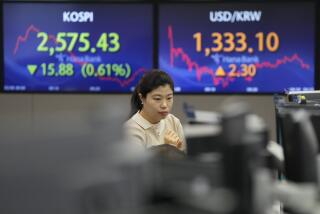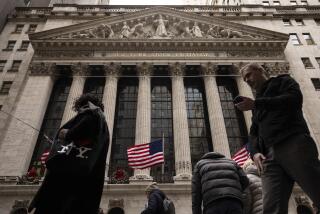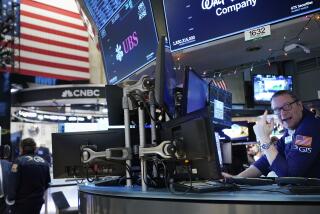Wall Street looks to earnings data for a stock boost
Wall Street is betting on another quarter of stellar corporate earnings growth to bolster stock prices, even as Europe’s worsening debt nightmare threatens the global financial system.
U.S. stocks have fallen for the last two trading sessions as Europe’s crisis has deepened, but the damage has been limited — while markets across the Atlantic have crumbled.
Many big investors say they are reluctant to sell U.S. shares because they believe the economy will accelerate in the second half of this year. They expect to have that outlook reinforced by second-quarter earnings reports, which begin to roll out this week.
In a hopeful sign, aluminum giant Alcoa Inc. late Monday said second-quarter earnings more than doubled from a year earlier and that its outlook “remains positive.” Alcoa is the first major U.S. company to report results.
But Europe’s woes are likely to further test investors’ resolve unless the debt situation stabilizes soon.
Stocks worldwide fell sharply Monday as interest rates on bonds of Europe’s most debt-ridden countries continued to surge.
While euro zone authorities still are wrestling with bailouts of Greece, Ireland and Portugal, the “contagion” from the debt crisis has spread to Spain and Italy over the last week.
“Spain and Italy are nearly five times the size of Greece, Portugal and Ireland and carry nearly four times the volume of debt,” said Michael Darda, economist at MKM Partners in Stamford, Conn. “Thus, they are a much larger threat to the integrity of the euro zone itself.”
Market yields on Spanish and Italian bonds have risen for six straight sessions as investors demand ever-higher returns to buy the countries’ debt — a sign of waning confidence in those nations’ fiscal outlooks.
The annualized yield on 10-year Italian bonds soared to 5.68% from 5.27% on Friday and 4.91% a week ago. The Spanish 10-year bond yield jumped to 6.03% from 5.68% on Friday.
By contrast, the U.S. Treasury pays less than 3% to borrow money for a 10-year term.
As Spanish and Italian bond yields climb, the risk is that it will become too expensive for the countries to roll over existing heavy debt burdens at market rates. That’s what forced Greece, Ireland and Portugal to seek bailouts from the rest of the European Union over the last 14 months.
Analysts have warned that if the crisis ensnared Spain and Italy, the future of the euro zone and the 12-year-old euro currency would be threatened because there would be no way the rest of Europe could bail out those two huge economies.
European stock markets, which were hammered last week, tumbled again Monday. The Italian market plummeted 4% after diving 7.2% last week. Spanish stocks slid 2.7% for the day, Portugal slumped 4.1%, France fell 2.7% and the German market sank 2.3%.
The euro plunged 1.7% to a four-month low of $1.402 from $1.426 on Friday.
Some nervous investors ran to gold. The metal hit a record high early in the session, reaching $1,557.60 an ounce. It closed at $1,548.80 in New York futures trading, up $7.60 for the day. The record closing high was $1,556.70 on May 2.
On Wall Street, the Dow Jones industrials fell 151.44 points, or 1.2%, to 12,505.76. Most broader U.S. indexes lost 1.2% to 2% for the day. But trading volume was muted, indicating there was no wild rush for the exits.
After the closing bell, Alcoa reported second-quarter earnings of 32 cents a share, excluding one-time items, compared with 13 cents a year earlier. The results were a penny short of analysts’ consensus estimate of 33 cents, but the company said it still expected aluminum demand to rise 12% this year.
“Although the economic recovery is uneven, the overall outlook for Alcoa and for aluminum remains positive,” Alcoa Chief Executive Klaus Kleinfeld said.
Alcoa shares slipped to $15.85 in after-hours trading after ending the regular session at $15.91.
Marshall Front, who oversees $600 million at money manager Front Barnett Associates in Chicago, said he remained optimistic that second-quarter results overall would support the bullish case for stocks. “I think we’re going to see pretty good earnings,” he said.
Excluding a large planned write-down by Bank of America Corp., quarterly earnings of the Standard & Poor’s 500 companies are expected to rise 13.7% from a year earlier, according to analyst estimates tracked by FactSet Research.
Relatively few companies have warned in recent weeks that their results might fall short, said John Butters, an analyst at FactSet: “We’re not seeing commentary from companies that the numbers are too high.”
But a major threat to earnings in the second half could be the euro’s slide: The weak dollar has been a boon to U.S. multinational companies for the last year. A stronger dollar could make U.S. exports more expensive overseas.
A more serious risk is that Europe’s debt crisis could turn into a full-blown global financial crisis similar to what occurred in 2008. Shares of Europe’s biggest banks — which own large amounts of government bonds — have plummeted in recent days, and benchmark short-term interest rates on the Continent have risen, signs of growing stress in the financial system.
In an echo of the 2008 crisis, Italy’s stock market regulatory agency Monday announced measures to try to curb stock “short selling,” trading strategies that are bets on falling prices.






